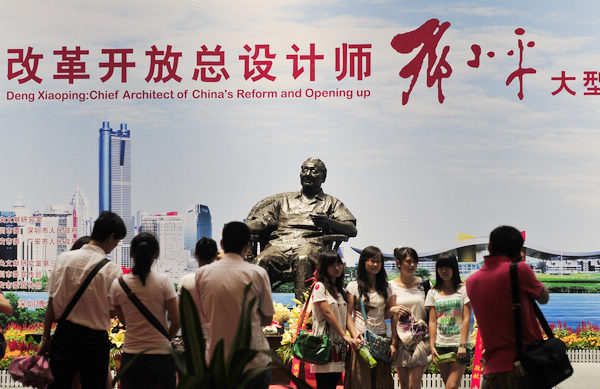|
|||||||||||
BEIJING - Experts have called for a more active attitude among officials and a deeper and thorough reform in China, as the country is doubling its effort to maintain economic growth under the mounting pressure of social management.
Groundbreaking thoughts, determination and sometimes self-sacrifice are essential in future reform to shake the vested interest groups who have to some extent monopolized the benefits of China's opening-up, said Yu Keping, deputy director of the Central Compilation and Translation Bureau.
|
 |
|
Visitors take photos in front of a bronze statue of Deng Xiaoping at an exhibition about the late Chinese leader at the Shenzhen Museum in 2010. [Yuan Shuiling / for China Daily] |
Yu, known for his essays promoting democracy, noted China is facing a rather "abnormal" situation, in which the elderly show more enthusiasm in pushing progressive changes than the younger generation.
Yu said he believes this stems from a dread of speaking out, especially among younger officials, since they are concerned that "being bold may cost them their careers".
Yu made the remarks when commemorating several speeches made by China's late leader Deng Xiaoping 20 years ago on his milestone tour to southern China.
The tour, as well as the remarks made by the then 88-year-old, is widely remembered as it ushered in a market economy that has lifted China all the way to becoming the world's second-largest economy.
However, not everyone has been served an equal slice of the 20-year economic boom, due to reasons like a widening gap in income distribution and social welfare, according to Liu Shanying, a political science researcher at the Chinese Academy of Social Sciences.
Liu said the disparity has resulted in rising social frictions, and the call for deeper reform and improved social management to tackle the issue is likely to be among the hot topics for the upcoming legislative and political advisory sessions in early March.
China's income surveys for urban and rural residents are currently carried out separately. The per capita disposable income of urban residents last year was 21,810 yuan ($3,460), while the per capita net income of rural residents was 6,977 yuan.
The World Bank has estimated that China's Gini coefficient - a gauge to measure income disparity - had reached 0.47 in 2009, higher than the internationally accepted threshold of 0.4, which indicates income inequality may threaten social stability.
Residents in the southern village of Wukan in Guangdong province, the breeding ground that fostered the country's first few special zones including Shenzhen and Zhuhai, have once again put their hometown in the headlines 20 years after Deng's tour.
Last year, residents in Wukan waged months of protests against illegal land use and corruption of village officials.
The standoff between villagers and some local officials was not defused until December, when Zhu Mingguo, deputy Party chief of Guangdong, held a direct dialogue with villagers and promised a "fair and open" investigation.
However, protests may not be the only approach to resolve similar problems.
Zaoyuanliu, a village in the suburbs of Xi'an, Northwest China's Shaanxi province, accomplished last year an almost impossible task of relocating about 405 families within three weeks without petitions, Xinhua News Agency reported.
"Justice and openness in the procedure are especially valued, and a joint assets evaluation by all parties involved, including the government, real estate developers and villagers, was carried out," Gao Xuanliang, a local public security official in Baqiao district, which administers Zaoyuanliu, was quoted as saying.
At least 18 meetings were held to reach agreement among interested parties during the 20-day relocation, the report said.
Wang Yukai, an expert with the Chinese Academy of Governance, said the two cases have added new perspectives in solving social problems confronting the country .
However, Sun Liping, an expert on the country's social and economic transition, noted that not only officials, but grassroots communities, can sometimes resist continued reform.
"Grassroots communities are afraid of change since they are unsure if their current rights and interests can be preserved in a new round of reform," he said.
In such cases, ensuring fairness and justice during the reform is key to rallying social support, he said.
Huang Yuli contributed to this story.
Related Stories
China to hold annual 'two sessions' 2012-02-21 21:15
Top advisory body prepares for annual session 2012-02-21 21:47
National advisory body prepares for session 2012-02-26 22:30
Parents look to sessions for more kindergartens 2012-02-28 07:43
Lawmakers satisfying constituencies' needs 2012-02-28 08:06
Beijing restricts non-local cars during two sessions 2012-02-26 14:27
Hot Topics
Wu Ying, iPad, Jeremy Lin, Valentine's Day, Real Name, Whitney Houston, Syria,Iranian issue, Sanyan tourism, Giving birth in Hong Kong, Cadmium spill, housing policy
Editor's Picks

|

|

|

|

|

|







